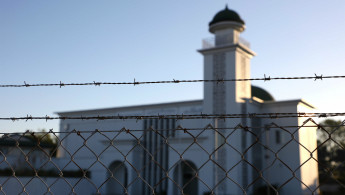Police said two mosques were targeted in the attack that Prime Minister Jacinda Ardern said marked "one of New Zealand's darkest days".
Witnesses spoke of victims being shot at close range, with women and children also believed to be among those killed.
The gunman at one mosque was an Australian-born citizen, Australian Prime Minister Scott Morrison said in Sydney, describing him as "an extremist, right-wing, violent terrorist".
It was not immediately clear how many attackers were involved, but New Zealand police said that four people - three men and a woman - were taken into custody.
Commissioner Mike Bush said there were "significant" and "multiple" fatalities. A number of IEDS (improved explosive devices) were also found and neutralised by the military.
A Palestinian man who was in one of the mosques said he saw someone being shot in the head.
"I heard three quick shots, then after about 10 seconds it started again. It must have been an automatic - no one could pull a trigger that quick," the man, who did not wish to be named, told AFP.
"Then people started running out. Some were covered in blood," he said, adding that he joined the fleeing crowd and managed to escape.
Local media reported at least nine people were dead.
Video and documents circulating online - but not officially confirmed - suggested the shooter had streamed his attack on Facebook Live.
AFP has examined the footage, which has subsequently been taken down. Journalists experienced in verification techniques said it appeared to be genuine.
New Zealand police described it as "extremely distressing" and urged web users not to share it.
A manifesto had also been posted online on accounts linked to the same Facebook page, suggesting the attack was racially motivated.
A social media account had also posted a number of pictures of a semi-automatic weapon covered in the names of historical figures, many of whom were involved in the killing of Muslims.
Police, who initially imposed a city-wide lockdown, sent armed officers to a number of scenes.
"This is an evolving incident and we are working to confirm the facts, however we can confirm there have been a number of fatalities," Bush said.
"Police are responding with its full capability to manage the situation, but the risk environment remains extremely high."
'Darkest day'
An ashen-faced Ardern said she was unable to confirm the number of fatalities, with events still unfolding.
"It is clear that this is one of New Zealand's darkest days," she told reporters. "Clearly, what has happened here is an extraordinary and unprecedented act of violence."
The two known targets were the Masjid al Noor in central Christchurch, and a second mosque in suburban Linwood.
One witness told stuff.co.nz he was praying when he heard shooting - and then saw his wife lying dead on the footpath outside when he fled.
Another man said he saw children being shot.
"There were bodies all over," he said.
An eyewitness told Radio New Zealand that he heard shots fired and four people were lying on the ground, with "blood everywhere".
Police warned Muslims all over the country not to visit mosques "anywhere in New Zealand". Friday is Islam's holy day.
Christchurch city council offered a helpline for parents looking for kids attending a mass climate change rally nearby.
The Bangladesh cricket team -- which had been in Christchurch for a test match against New Zealand that was later cancelled -- all escaped without injury.
A spokesman said the attack happened as some of players got off a team bus and were about to enter the mosque.
"They are safe. But they are mentally shocked. We have asked the team to stay confined in the hotel," he told AFP.
Mass shootings are rare in New Zealand, which tightened its gun laws to restrict access to semi-automatic rifles in 1992, two years after a mentally ill man shot dead 13 people in the South Island town of Aramoana.
However, anyone over 16 can apply for a standard firearms licence after doing a safety course, which allows them to purchase and use a shotgun unsupervised.
Christchurch, a relatively small city in the south of New Zealand, hit global headlines in 2011 when it was struck by a deadly earthquake.
Dozens of people died and the city's historic cathedral was toppled in the disaster.





 Follow the Middle East's top stories in English at The New Arab on Google News
Follow the Middle East's top stories in English at The New Arab on Google News
![Netanyahu furiously denounced the ICC [Getty]](/sites/default/files/styles/image_330x185/public/2024-11/GettyImages-2169352575.jpg?h=199d8c1f&itok=-vRiruf5)
![Both Hamas and the Palestinian Authority welcomed the ICC arrest warrants [Getty]](/sites/default/files/styles/image_330x185/public/2024-11/GettyImages-2178351173.jpg?h=199d8c1f&itok=TV858iVg)
